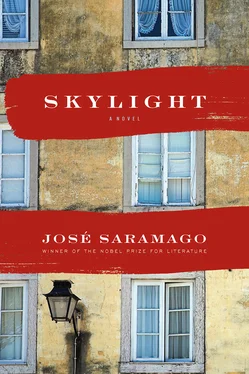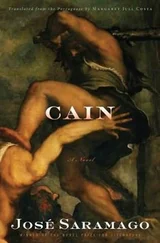Silvestre’s eyes seemed to withdraw and go back to the distant past. They could see the dying man’s shabby room, as shabby as his own, see his long fingers with their purplish nails, his pale face with eyes like burning coals.
“You’ve never had a friend, have you?” he asked.
“No, never.”
“That’s a shame. You don’t know what it’s like to have a friend. You also don’t know what it’s like to lose one, nor how much you miss him when you think about him. That’s one of the things life hasn’t taught you.”
Abel said nothing, but he nodded. Silvestre’s voice and the words he was hearing were reordering his ideas. A dim but insistent light was shining into his mind, illuminating its shadows and dark corners.
“Then came the war,” Silvestre said. “I went off to France, not because I wanted to, but because they sent me. I had no choice. There I was, up to my knees in the mud of Flanders. I was at La Couture. When I talk about the war, I can’t say much. I imagine what this last one must have been like for those who lived through it, and I say nothing. If that first one was the Great War, what will they call this second war? And the one after that?” Without waiting for a reply, he went on: “When I came back, something was different. Well, after two years away, things are bound to change, but what had changed most was me. I returned to my work as a cobbler, but in another workshop. My new colleagues were family men who, as they said quite openly, didn’t want any trouble. And so as soon as they found out who and what I was, they told the boss. I got the sack and was threatened with the police…”
Silvestre gave a toothless smile, as if remembering some bitterly comic episode, but soon recovered himself:
“Times had changed. Before I went to France, I could say what I liked to my colleagues and no one would have dreamed of denouncing me to the police or to the boss. Now I had to keep quiet. It was then that I met my Mariana. Seeing her now, you can’t possibly imagine what she looked like then. She was lovely as a May morning!”
Almost without thinking, Abel asked:
“Do you love your wife?”
Taken by surprise, Silvestre hesitated. Then, calmly and with deep conviction, he answered:
“Yes, I do, very much.”
“It’s love,” thought Abel, “it’s love that gives them this calmness, this peace.” And suddenly he was gripped by a violent desire to love, to give himself, to find the red flower of love growing in his arid life. Silvestre continued to speak in his serene voice:
“I thought of my friend Abel, my other friend Abel.”
Smiling, Abel nodded his thanks for the compliment.
“I reread the books he’d left me and began to live a double life. By day, I was a cobbler, a silent cobbler who could see no farther than the soles of the shoes he was mending. By night, I was my true self. Don’t be surprised if the way I speak is too refined for my profession. I knew a lot of very cultivated people, and although I may not have learned as much as I should, I learned what I could. I sometimes risked my life. I never refused to do anything they asked of me, however dangerous.”
Silvestre was speaking more slowly now, as if drawing back from a painful memory or as if, unable to avoid talking about it, he were trying to find a way to do so:
“There was a strike by railway workers. After twenty days they were ordered back to work by the government. In response, the central committee gave orders for the workers to abandon all train stations. I was in touch with the railway workers and had a particular mission to carry out. I was a trusted member, despite my youth. They put me in charge of a group that was supposed to distribute leaflets in an area of Barreiro, at night. In the early hours we got into a fight with some members of the Monarchist Youth Movement…”
Silvestre rolled another cigarette. His hands were shaking slightly and he avoided Abel’s eyes:
“One of them died. I only caught a glimpse of his face, but he was very young. He was left lying in the road. A very cold, fine drizzle was falling, and the streets were full of mud. The police arrived, and we ran away before they could identify us. We never found out who had killed the lad.”
A heavy silence fell, as if the dead man had come and sat down between them. Silvestre kept his head lowered. Abel cleared his throat and asked:
“And then?”
“Well, it went on like that for years. Later, I got married. Mariana had a pretty tough time on my account, but she always suffered in silence. She thought I was doing the right thing and never criticized me, never tried to divert me from my path. I owe her that. The years passed, and here I am, an old man.”
Silvestre went into the apartment and returned shortly afterward bearing the bottle of cherry brandy and two glasses:
“Would you like a drink to warm you up?”
“I would.”
With their glasses full, the two men fell silent.
“So,” said Abel a few minutes later.
“So what?”
“Where is this ‘way of seeing life’?”
“You haven’t worked it out for yourself yet?”
“Possibly, but I’d prefer you to tell me.”
Silvestre drank his cherry brandy down in one, wiped his mouth with the back of his hand and said:
“If you haven’t worked it out for yourself, that means I’ve failed to tell you what I feel. Nothing surprising about that. There are some things that are very difficult to put into words. We think we’ve said all there is to say, and it turns out…”
“Now don’t run away.”
“I’m not. I learned to see beyond the soles of these shoes. I learned that behind this wretched life we lead there is a great ideal, a great hope. I learned that each individual life should be guided by that hope and by that ideal. And people who don’t feel that must have died before they were born.” He smiled and added: “Those aren’t my words. It’s something I heard someone else say years ago.”
“In your view, then, I belong to the group who died before they were born?”
“No, you belong to another group, the ones who haven’t yet been born.”
“Aren’t you forgetting about all my experience of life?”
“Not at all, but experience is only worth anything when it’s useful to other people, and you’re not useful to anyone.”
“I agree that I’m not useful, but in what way has your life been useful?”
“I tried to do something, and even if I failed, at least I tried.”
“You tried in your own way, yes, but who’s to say it was the best way?”
“Almost everyone nowadays would say it was the worst. Is that the group you belong to?”
“To be perfectly honest, I don’t know.”
“You don’t know? At your age and after everything you’ve seen and been through, you still don’t know?”
Abel could not look Silvestre in the eye and lowered his head.
“How can you not know?” Silvestre said again. “Has twelve years of living the way you’ve been living not shown you how badly people live? The poverty, the hunger, the ignorance, the fear?”
“Yes, but times have changed…”
“Yes, times have changed, but people haven’t.”
“Some have died. Your friend Abel, for example.”
“But others have been born. My other friend Abel, for example, Abel Nogueira.”
“Now you’re contradicting yourself. Just now you were saying I belonged to the group who haven’t yet been born.”
Silvestre again drew the bench closer to him, picked up the shoe and resumed his work. With a tremor in his voice, he said:
“Perhaps you didn’t understand me.”
“I understand you better than you think.”
“Don’t you agree that I’m right, then?”
Читать дальше












